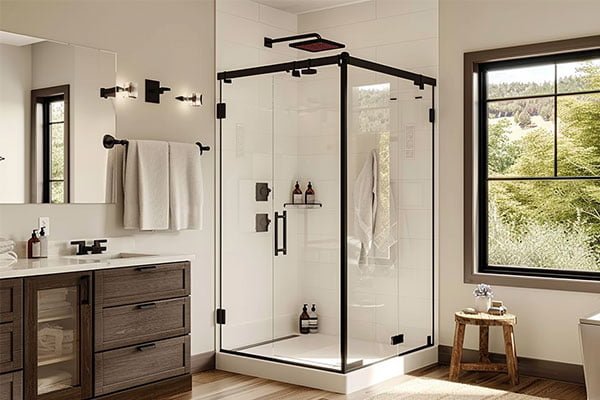Understanding the various European standards for shower door hardware is essential for ensuring product safety, quality, and performance. Whether you’re a manufacturer, supplier, or homeowner, knowing which standards apply to shower door hinges, handles, seals, and other hardware will help you make informed decisions. This guide provides an overview of the key European standards and what they mean for your bathroom project.
Why European Standards Matter for Shower Door Hardware
European standards are designed to ensure that products sold across the continent meet minimum requirements for safety, performance, and sustainability. For shower door hardware, these regulations are especially important because bathrooms are high-moisture environments where improper hardware can lead to safety risks, durability issues, and corrosion.
By adhering to these standards, manufacturers not only ensure customer satisfaction but also avoid costly compliance issues. In addition, products that meet European standards tend to have a higher market value because they’re seen as more reliable and safe.
Key European Standards for Shower Door Hardware
The following table summarizes the most important European standards for shower door hardware, including the scope of each and its importance.
| Standard | Scope | Why It Matters | What to Look For |
|---|---|---|---|
| EN 12150 | Toughened safety glass | Ensures the glass used in shower doors is impact-resistant and shatter-proof | Verify that glass in shower doors complies with this standard |
| EN 14428 | Shower enclosures | Addresses watertightness, safety, and durability of shower enclosures | Check compliance to avoid leaks and water damage |
| EN 12519 | Performance of doors and windows | Ensures the durability and performance of moving parts like hinges and handles | Look for hinges and handles that meet EN 12519 standards |
| RoHS | Restriction of hazardous substances | Limits the use of harmful chemicals in electronics, like electric towel warmers | Ensure products with electrical components are RoHS-compliant |
| REACH | Regulation of chemicals | Protects users from exposure to hazardous chemicals in metal finishes and seals | Confirm REACH compliance for metal components |
| EN 1670 | Corrosion resistance | Ensures metal components can resist rust and corrosion in wet environments | Opt for corrosion-resistant hardware meeting EN 1670 |
| EN 1906 | Performance of handles and locks | Guarantees strength and durability of handles and locks in high-use areas | Check that handles and locks are EN 1906 compliant |
Detailed Breakdown of Key Standards
1. EN 12150: Toughened Safety Glass
This standard covers the use of toughened (or tempered) glass in shower doors to ensure it meets safety requirements. It specifies that the glass must be able to withstand impact and temperature changes without breaking dangerously.
| Feature | Description |
|---|---|
| Glass type | Toughened safety glass |
| Safety test | Impact and thermal shock resistance |
| Application | Shower door panels, especially frameless glass doors |
2. EN 14428: Shower Enclosures
EN 14428 defines the safety, durability, and watertightness requirements for shower enclosures, including the hardware that supports glass doors. It ensures your shower remains sealed and secure, preventing leaks and potential water damage.
| Feature | Description |
|---|---|
| Focus | Watertightness, safety, and durability |
| Test areas | Water retention, stability, impact resistance |
| Application | All parts of the shower enclosure, including door seals |
3. EN 12519: Durability of Hinges and Handles
Although primarily aimed at windows and doors, EN 12519 applies to shower door hardware components such as hinges and handles. This standard ensures that moving parts remain functional over time, even in high-moisture environments.
Environmental and Health Regulations
4. RoHS (Restriction of Hazardous Substances)
The RoHS Directive restricts the use of harmful substances like lead, mercury, and cadmium in electronic and electrical components. If your shower door hardware includes electrical parts such as electric towel warmers or automated doors, they must comply with RoHS.
| Substance | Permitted Level |
|---|---|
| Lead | < 0.1% |
| Mercury | < 0.1% |
| Cadmium | < 0.01% |
5. REACH (Registration, Evaluation, Authorisation, and Restriction of Chemicals)
REACH aims to protect both users and the environment from harmful chemicals. This regulation is especially relevant for the metal components of shower door hardware, ensuring that they don’t release harmful substances when exposed to moisture.
| Corrosion Level | Test Environment |
|---|---|
| Class 1 | Low humidity environments |
| Class 2 | Moderate humidity environments |
| Class 3 | High humidity environments (e.g., bathrooms) |
Environmental and Health Regulations
6. EN 1670: Corrosion Resistance
Given that bathrooms are high-humidity environments, corrosion resistance is critical for shower door hardware. EN 1670 ensures that metal components like hinges, handles, and seals can withstand moisture without rusting.
| Corrosion Level | Test Environment |
|---|---|
| Class 1 | Low humidity environments |
| Class 2 | Moderate humidity environments |
| Class 3 | High humidity environments (e.g., bathrooms) |
7. EN 1906: Door Handle and Lock Performance
This standard tests the mechanical performance and durability of door handles and locks, including those used in shower doors. It ensures that the handles and locking mechanisms can withstand frequent use while maintaining their functionality and aesthetics.
| Feature | Requirement |
|---|---|
| Durability | Must remain functional after a high number of uses |
| Strength | Must withstand applied force without bending or breaking |
Conclusion: Ensuring Compliance for Your Shower Door Hardware
It is imperative to ensure that the shower door hardware you choose satisfies European standards in order to ensure longevity, functionality, and safety. The important requirements, including EN 1670 for corrosion resistance, EN 14428 for watertightness, and EN 12150 for safety glass, guarantee that your bathroom hardware will continue to work dependably for many years. Furthermore, users are shielded from hazardous chemical exposure by RoHS and REACH laws, which not only makes your bathroom safer but also environmentally sustainable.
You may ensure that international safety and environmental regulations are met in addition to investing in long-lasting, high-quality products by choosing shower door hardware that meets these European standards. Ask for certifications whether you are shopping for hardware or specifying hardware for a project to ensure that it complies with the relevant standards.





3 Responses
If you are going for most excellent contents like myself, simply go to see this site every day for the reason that it offers quality contents, thanks
I think this is one of the most important info for me. And i am glad reading your article.
But want to remark on some general things, The web site style is ideal,
the articles is really excellent : D. Good job, cheers
My brother suggested I may like this website. He was once
entirely right. This publish truly made my day. You can not
imagine simply how a lot time I had spent for this information! Thanks!!